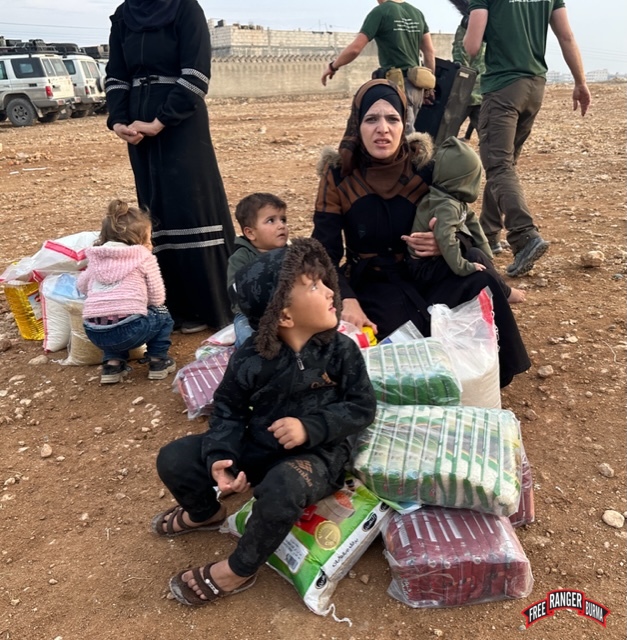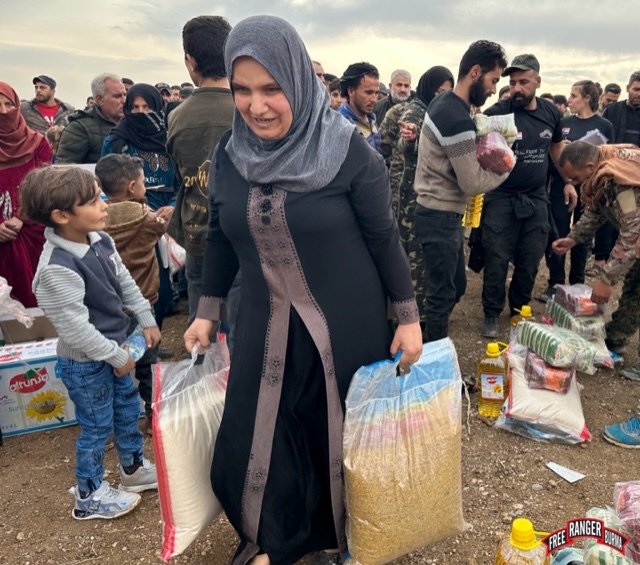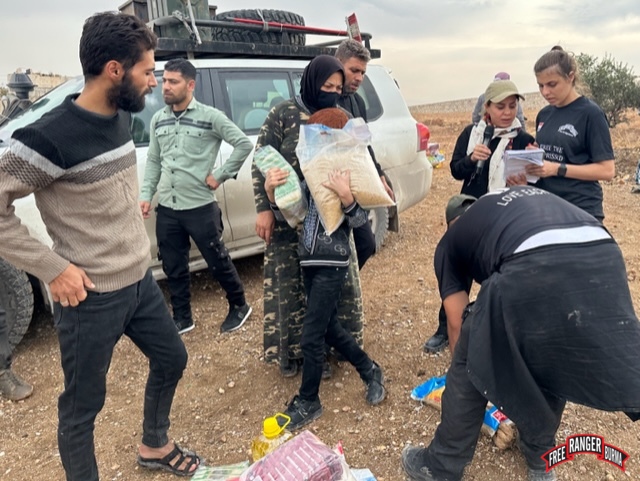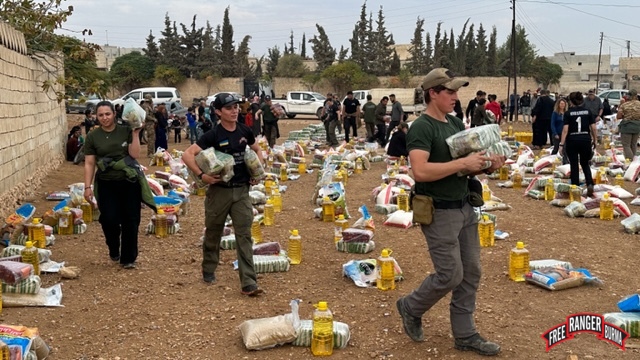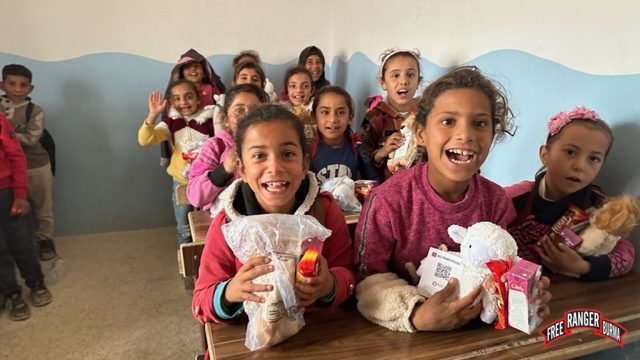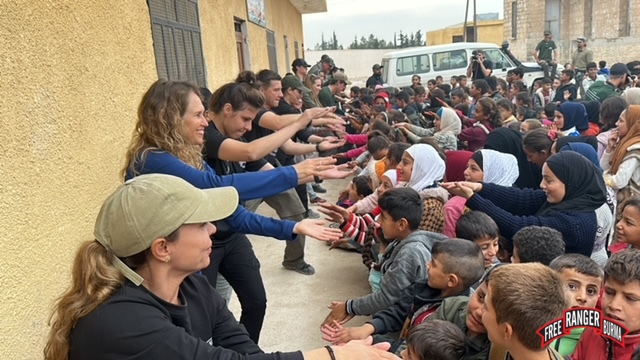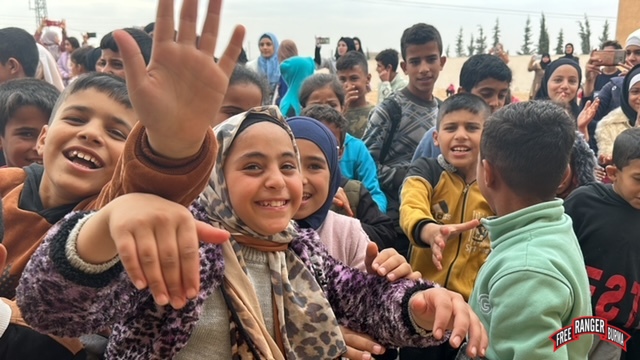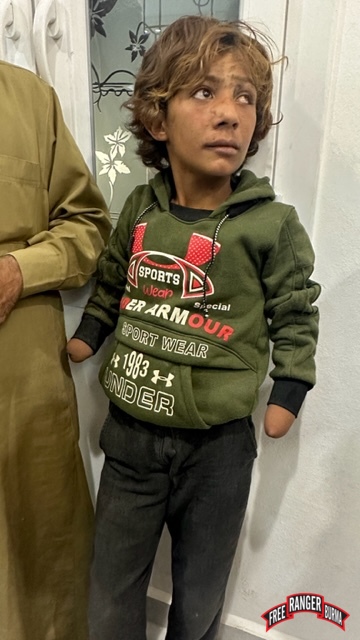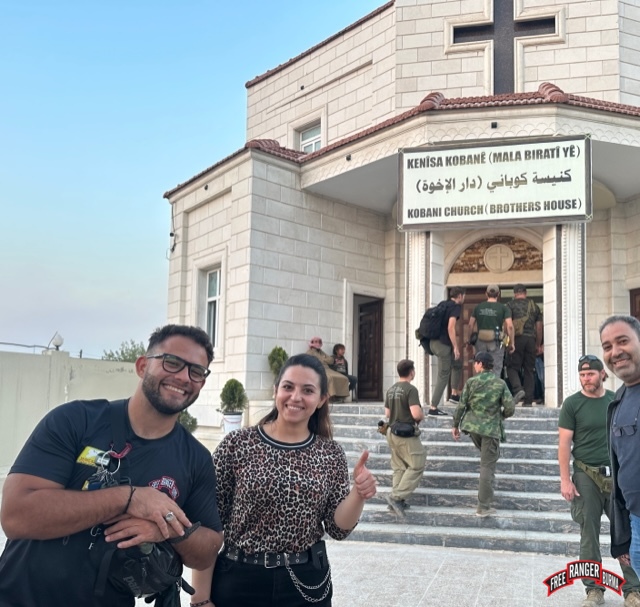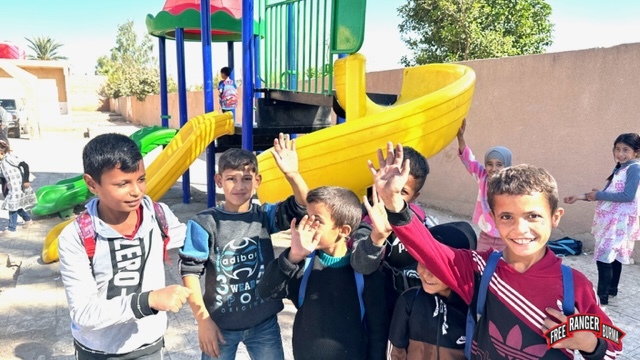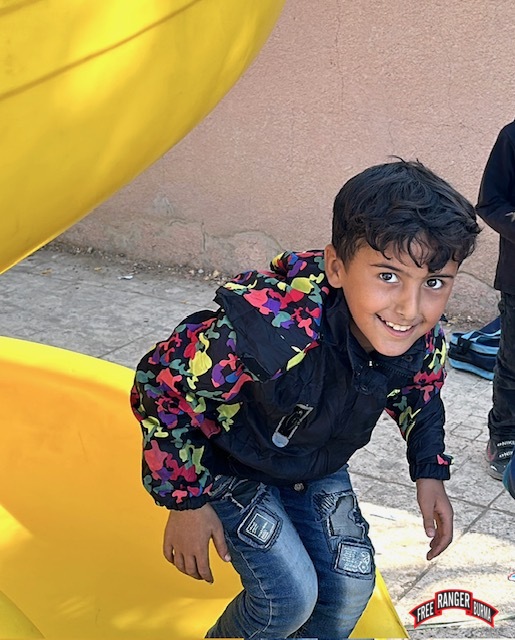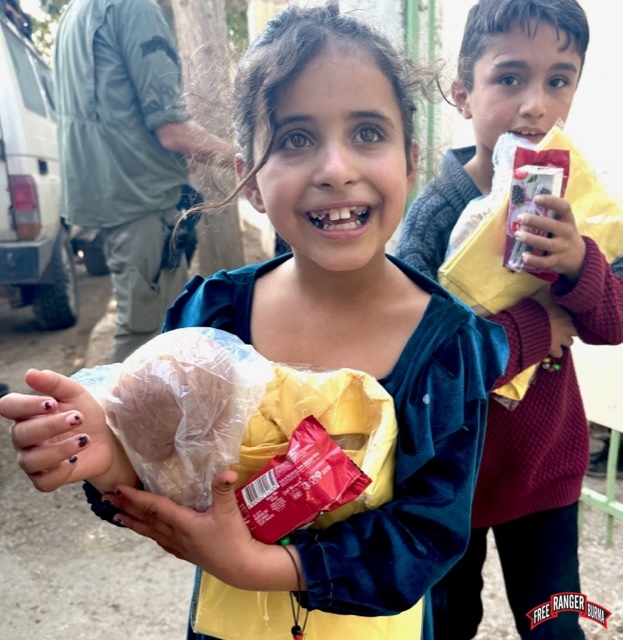Syria; Rockets and Enemies and Playgrounds and Friends
2 December 2023
Syria
Rockets came screaming in, impacting all around us in Deir ez-Zor, northeast Syria. Iranian militias were firing at the Syrian Democratic Forces (SDF), American forces, and us, as they promised they would. We had all come out of the buildings at an SDF position during the first strikes, and were now on the ground against a wall ready to help any wounded with our ambulance and medical bags prepped. We were also praying. 30 rockets later, after shrapnel had been flying all around us, we thanked God that no one was wounded in that particular attack at this base. However, three Americans had been wounded at their base in a different area, totaling over 50 Americans wounded in the last month from Iranian militia attacks.
This was just one night, and the next night was similar. Rockets were launched again, but this time the Americans, who were about a kilometer away, fired back with their own systems and airstrikes which came in along the border in Iraq and across the Euphrates River, an Iranian supported area, to hit targets. The rocketing and missiles have escalated, especially since the Israeli incursion into Gaza. There have always been attacks and threats by Iranian militias from Iraq and in Syria against American and Kurdish forces. However, after the U.S. public support for Israel, these militias were energized even more. They promised to attack, which they did and they still are, every single day. As one Kurdish leader told us, “The Iranians are fighting in wars all over, but they don’t use their own soldiers. They attack and destroy using proxy forces in Iraq, Syria, Gaza, and Yemen.” The Iranian government also provides military support to the dictators in Burma as they kill their own people, as well as the Russian military as they kill Ukrainians.
There have been rocket attacks against American bases in Syria as well as some in Iraq, including the International Airport in Erbil, Kurdistan, and northern Iraq. Usually, we are not anywhere near American forces, as we have a different mission and are not partnering together. However, sometimes we are, and we are often with the SDF. This is because the SDF has control over this area and we need their permission to have the access to help. In this area, we help Kurds, Arabs, Christians and everyone we can and we are very grateful that the Kurdish Regional Government back in Kurdistan, Iraq, allows us to come to help and we are grateful for the SDF for the same help here.
Since the beginning of the attacks by ISIS here in Syria and in Iraq, we have been invited and have felt God call us to come to stand with these people and share His love. In particular, in Deir ez-Zor, along the Euphrates River in the eastern part of Syria, there is a village called Bagouz, which was the last stronghold of ISIS, where the most hardcore and extreme still-living members of ISIS congregated in 2019. Bagouz is on the Euphrates River, right where it empties from Syria into Iraq. ISIS was surrounded there by the SDF, who also had coalition air support, and were pounded into submission.
We were there back in 2019 to give help, hope, and love in Jesus’ name, even to our enemies, ISIS. We have lost team members to ISIS and many friends and some of us have been wounded by them, and so this seemed like a very strange situation to be trying to help ISIS as they fled. There is a verse in the Bible about taking care of your enemies, and by doing so, you put burning coals on their head. We experienced that as we gave food, water, and medical care to ISIS members. Many of them cringed with shame that we, their enemies, were helping them. But some also burst into tears when we prayed with them. For us, it was healing amidst all the evil we had seen. The ISIS members who we were helping were mostly women and children who came out in surrender. There were a few men as well, and we had an opportunity to share the love of Jesus with many of them. We were able to feed 25,000 of the 35,000 that came out between the end of January and the final fall of Bagouz in March. We treated 4,000 wounded. There were children with amputated legs from air strikes. There were children who were shot, by ISIS themselves, as they tried to flee. There were some caught in the crossfire between SDF and ISIS. There were victims of burns, gunshots and bombings. It was a disaster. But we were able to help save lives, provide some healing, and give love. Most of the ISIS women still threatened us and hated us. But about one in 10 would say thank you. And some of those, when we prayed with them, began to cry and said they were sorry.
This reminded me that anyone can change, like the story of the apostle Paul, who was named Saul before his conversion, and was murderously against Christians and supported their killing. Jesus met him and changed him. Anyone can change, and this includes ISIS. We pray that some of those people we met heard the gospel and that it went into their hearts, and that they would change. At the same time, a strong stand needed to be taken against their acts of evil. Without that strong stand, they would still be out slaughtering and destroying. We are very grateful to the Syrian, Kurdish, Iraqi, and Coalition forces that defeated ISIS.
Most of the ISIS captives, many of whom were foreign nationals who had come to Syria to join ISIS, later went to Al Hol, which is a camp with over 50,000 ISIS from over 60 different nations. The camp is a miserable breeding ground of hopelessness and hate. Our appeal has always been that the home countries where these foreigners come from, would take home their women and the children so the children don’t grow up in a prison of hate.
This mission we were back down in Dier Ezzoir, in the Bagouz area, to follow up on a promise we made to the people there. We had promised a playground, and two ambulances to the SDF to move adults, civilians, and soldiers in need of medical care. We were able to provide these. Thank you, Reload Love, for the playgrounds, and for those of you who helped us provide the ambulances. These gifts are life-giving and life-saving. In any case, we had come last year and done children’s programs in the very areas where the fighting was in 2019, and we had promised two playgrounds. Our staff put them in a few months ago: one in a town called Suer and the other in Bagouz. When we came this time, the SDF opened the way for us to go down there. One of our team members, Muhammad, who was wounded six times by ISIS in the battle of Mosul and who was always with us, was also with us in Bagouz. At our children’s program, he stood up and said, “Do you remember me? We fed you. We treated some of your wounded. We know some of you are actually still back here after the fall of Bagouz. We come in love and in peace.“ Many of the children, as well as men and women, nodded their heads, and said, “Yes, we remember your help for us. Thank you. You are welcome here.“ This was quite amazing to us and the children’s program was full of joy and laughter, not just among the children, but among the mothers and fathers who were there also.
We did a complete children’s program including songs and dances that we learned in Burma, and they danced with us. We kept the promise to build the playground and they thanked us for that. At the end of the program we gave out shirts and food. When it was over, I met with the teachers. Most of the women wore complete head coverings and burkas. I could only see their eyes. I started off with saying, “We are here in love, in Jesus’ name, because He loves us and He loves you. You can call on His name anytime. It doesn’t matter your religion. You can call on Him. He loves you. God sent Him to help us.” I went on to apologize, saying, ”You know, my country, America, we try to do good but we’re not God. And we’re not the devil. We are just people trying to do our best. And we have accidents; we have mistakes. We’ve killed your people unnecessarily. It wasn’t just ISIS. We know that. I’m so sorry. Please forgive us.“ And I said, “I love my country, but I don’t look at us like we’re different than you. We’re just human, trying to do our best. And I believe America should be here. We cannot fix every problem. We cannot fix the problem here, but we can stand with you and help there be a space for you all to work out how to share this country together.“
They all nodded their heads in response. I saw tears come to some eyes as they also came to mine, and I felt love in between us. They said, “Yes, America, please stay. We need you to protect us.” I told them that we don’t work for the government, but Christians who care about and pray for them supported us to come and help. They understood this and said, “You are welcome anytime. Please keep coming back, you make us feel less lonely and make us feel like we count.”
The Kurds, the Christians, and the Arabs, like those in Bagouz, are trying to form a new society. It’s very different than the dictatorship of Assad just across the Euphrates, or the dictatorship of the Iranians using Iraq as a thoroughfare, or the attacks of the Turkish government. What is going on in northeast Syria is an attempt for a grassroots democracy. It’s not yet a democracy, but people do have voices. I asked one Arab leader what he thought about the enemies and people around him and the different powers. And he said this: “Right now the biggest problem for us in northeast Syria is actually the Turks. They bomb us and they hit us with air strikes and drone strikes. They hit our infrastructure. They commit war crimes. It’s terrible. Also the Iranians attack us. The Iranian hand is in all these things as well, especially with the Assad government, keeping them going and poisoning everything and attacking us. And then there’s the Assad’s government: they will kill you. And the Russians are behind them, up to no good. And then there’s ISIS. Now they’re small, but they’re still a threat.”
I asked, “What about the Syrian Democratic Forces? What about this new government in northeast Syria?”
He answered, “Well, we don’t agree about everything, but you can talk to them. They’re not at all the same as any of those other governments. When you have a disagreement or a problem with the Syrian Democratic Forces, you can negotiate, you can talk. You aren’t just locked up, taken away, and executed, which is what will happen with every other group. So yes, we may disagree on many accounts, but they are the best option we have now and we hope America can see that and support them. First of all, for the sake of humanity, for us Kurds and Arabs and Christians and others here such as Yezidis, but also to block Iran, because Iran will destroy this place. So please stay with us.”
One of the last stops was in the town of Tell-Tamer where one of our Rangers from Burma, Zau Seng, was killed by Turkish forces in 2019 when they invaded. Zau Seng was our Kachin photographer and medic who was killed on November 3rd, 2019, when Turkish forces and their proxies, the Free Syrian Army, invaded northern Syria, displacing over 400,000 Kurds. We were later asked to build a hospital in Tell-Tamer, which is close to where Zau Seng died. We prayed and decided to do it even though we normally don’t build hospitals. Now it has been built and it has a picture of of Zau Seng smiling on the front of it. With the generous help of many people, we were able to build this hospital, but they still need funds to buy necessary medical equipment to put in the hospital, such as x-ray machines, surgical suites, beds, oxygen systems, and a maternity ward. All these, we lift up in prayer and gratitude for the help that has been given. On the way out we met with General Mazloum Abdi who is the commander of the SDF. He is a wise and kind man and doing his best to serve all the different communities and faiths in Northeast Syria. He and the SDF offer the best hope of positive change in Syria. We appreciate very much the international community standing with General Mazloum and the Kurds, Arabs, Christians, and Yezidis who make up the SDF.
Everywhere we went we prayed and we had a chance to talk about our hope, which is Jesus. We prayed that any governance without love will fail. And shared that when we run out of love, Jesus is there to forgive us, help us forgive others, and refill us with love. Thank you for praying for us. And if you feel led to help with needs here, such as ambulances, which costs $20,000 to $30,000, or a bakery for IDPs for $35,000, that would be a great boost to the people here. finally, we thank again the leaders of the Kurdish Regional Government that allow us to go and give this humanitarian assistance.
Thank you for praying for the people of northeast Syria as they try their best to live a better life surrounded by many enemies. They, like us, are not perfect at all, but we pray they can act in love, forgive their enemies, and be part of building new relationships together.
Thank you and God bless you,
Dave, family, and Free Burma Rangers in Syria

